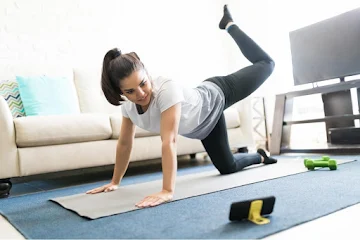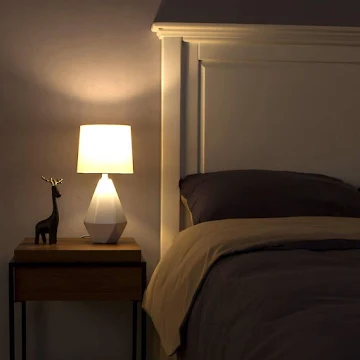You know those nights when no matter how exhausted your body feels, your mind is buzzing with a thousand thoughts, and sleep ironically enough, is a distant dream? Nights spent tossing and turning, kicking one leg out of your blanket and fluffing up the pillow? And even though you hit the sack at a reasonable hour, waking up the next morning feeling like you pulled an all-nighter? If this situation is all too commonplace, we have an idea about what could be causing your restless nights.
The thing is, getting a good night's sleep involves a lot more than just going to bed early. Your ability to fall asleep is influenced by not only how tired you feel physically, but also the activities you engage in during late evening hours. For instance, if you're too mentally stimulated by the time you go to bed, chances are a peaceful slumber would be difficult to achieve. Similarly, what you eat or drink during the hours leading up to your bedtime, also have an impact on how quickly and effortlessly you can doze off.
Nope, let us save you the pain of sifting through a hundred Google search results. We've put together a list of some activities you might be doing before bed, which lead to difficulty in falling and staying asleep at night. So without further delay, here's that curated round-up of 10 things that can sabotage your sleep, and you need to avoid doing before bedtime for good quality sleep.
1. Using Electronic Devices
I know I speak for many when I say that the most common thing we do before bed, is scroll through our feeds. Most of us will get ready for bedtime, snuggle up under our covers, and reach for the phone to go through social media. However, using your smartphone and in the process exposing yourself to bright light from the device, is known to arouse your both physiologically and psychologically. The artificial blue light messes up your body's internal clock and makes you more alert, by giving it the signal that its daytime due to the bright illumination. Furthermore, the pictures, funny videos and other stimuli you might be going through before bed, also contribute to the number of thoughts in your brain, thereby making it that much harder to fall asleep. The same goes for your laptop or smart tablet, and night mode doesn't help significantly enough to nullify the effect completely. If you must do something to fall asleep, reach for a calming book instead.

Image Courtesy - Pamper
2. Sipping On Caffeinated Drinks In The Evening
I'm not talking about gulping down a mug of coffee right before bed, that's too obvious a not-do. But there are other drinks with caffeine as well, such as your late evening tea, or the glass of soft drink you like to have after dinner. Especially if you're caffeine sensitive, even one cup of tea consumed later in the afternoon, can have an impact on your sleep quality. Most studies will tell you to not consume anything with caffeine in it, at least 4 to 6 hours before bedtime, depending on the impact it tends to have on your ability to snooze. And in case of high caffeine sensitivity, you might want to consider restricting it to before noon, or cutting it out altogether. Do remember, even green tea contains caffeine, so avoid a cup of that before bed as well.

Image Courtesy - Pexels
3. Getting Into Serious Conversations
Or arguments. As you can imagine, these serious conversations are definitely going to increase the number of thoughts in your mind thus stimulating you psychologically enough to have trouble falling asleep. How many times have you fought with your mom, or your partner right before bed, and spent the next couple of hours replaying the conversation in your head and thinking of clever comebacks you could have used? Even talking about important decisions that you are due to take, or discussing deadlines you're supposed to meet can increase your anxiety right before bedtime, and make relaxed sleep more difficult to achieve.

Image Courtesy - Envato
4. Working Out Later In The Evening
You'd think exercising in the evening would tire you out and make it easier to fall asleep. But unfortunately, studies indicate that the effects of a late workout are quite contrary. Strenuous physical activity during late evenings, or before bedtime can amp up your heart rate, make you feel more energetic and alert, and impact your sleep cycle negatively. It's highly recommended that you avoid getting into heavy workouts at least 3-4 hours before your usual bedtime, and instead get done with it early in the morning. You can also try lighter and more relaxing exercises, such as easy stretches or light yoga during those late evening hours to get your heartbeat stable enough for sleep.

Image Courtesy - Performance Health
5. Snacking On Fatty Foods Or Having A Late Heavy Dinner
Not just your sleep, but late heavy meals can also adversely impact your fitness goals by delaying fat burning. Additionally, if you're used to rummaging through your fridge late at night and snacking on whatever junk you can find, you're unintentionally impacting your body's natural sleep process. Most junk food tends to be heavy in carbs, sugar and fat, all of which increase your energy and reduce sleepiness. Late-night junk snacks also reduce your metabolism rate, negatively impact your sleep cycle, and contribute to weight gain. However, sleeping on an empty stomach is also a big no-no, so when you're feeling hungry during or before bedtime, stick to healthy snacks such as Greek yoghurt, almonds or scrambled eggs.

Image Courtesy - Indocare Diagnostics
6. Drinking A Lot Of Water
Yes, staying hydrated is extremely crucial from basically every health standpoint ever, but the words "through the day" are just as important to take note of. It's usually recommended that you consume at least 8 glasses of water throughout your day, but catching up on lost hydration right before bed won't cut it. In fact, studies indicate that consuming a lot of water before bedtime can negatively affect your heart health and interrupt your sleep cycle. Besides, waking up to use the washroom at 3 AM is bound to disturb your slumber. So, as a general rule of thumb, avoid drinking a lot of water at least 2 hours before you plan on hitting the sack.

Image Courtesy - Layla Sleep
7. Smoking
Nicotine is a stimulant, which means just like caffeine, it's supposed to wake you up. Most smokers tend to light one because of the belief that it helps them relax. However, that effect is more psychological as nicotine has the opposite effect on your body. It quickly rushes through your body, and increasing alertness. Thus it's advisable to not smoke any at least a couple of hours before you head to bed, and avoid reaching for the pack if, for some reason, you wake up in the middle of your slumber.

Image Courtesy - The New York Times
8. Watching Energetic TV Shows Or Fast-Paced Movies
Tying into the point of psychological stimulation, watching anything high-octane is highly likely to get you feeling more active. When you're watching something like a crime flick with high-speed chases, or a thriller movie with surprising twists, or an episode of a horror TV show replete with plenty of jump scares, your brain is doing the opposite of unwinding. Getting yourself riled up with action-packed or mentally-stimulating entertainment content will end up causing you trouble with putting your thoughts and yourself to sleep.

Image Courtesy - Pexels
9. Exposing Yourself To Bright Lights
Your circadian rhythm, which is a fancy medical term for the internal process regulating your sleep-wake time, is highly impacted by exposure to light and darkness. Your body's natural time-keeping clock tends to go for a toss when you expose it to bright light before or during bed, thus interrupting natural sleepiness, and causing sleep difficulties. What you need to do instead, is start reducing your light exposure come evening hours. If possible, resort to just a lamp in your room preferably with a warmer shade, as opposed to the bright fluorescent lights you might be used to.

Image Courtesy - Pinterest
10. Not Devoting Time To Unwind Your Mind
Tying into the above suggestion, spending the couple of hours leading up to your bedtime on relaxation-based activities like journaling, meditation or listening to a podcast, is extremely important to ease your brain and body into the state of sleep. This is especially important if you tend to stay up during the night worrying incessantly, or battling anxiety. Unwind your mind with calm things, sip on some chamomile flavoured tea, and bring your day to an end by drawing up a to-do list for tomorrow.

Image Courtesy - Pexels
All you need to do is avoid these things before bedtime, and soon you'll be soundly sleeping all those night hours away!

